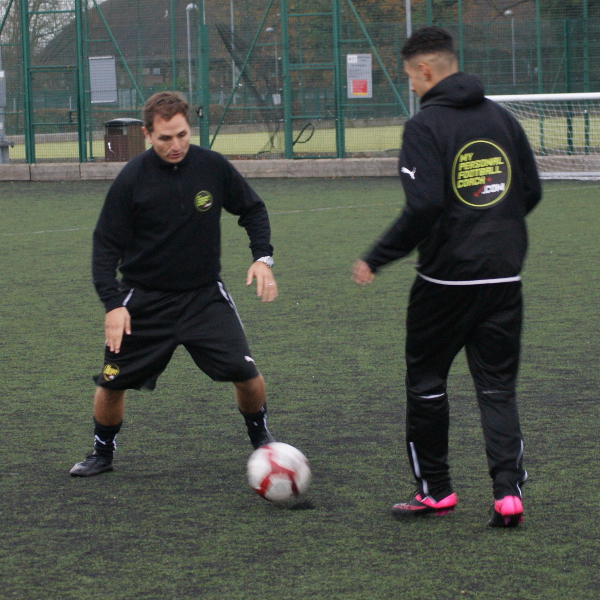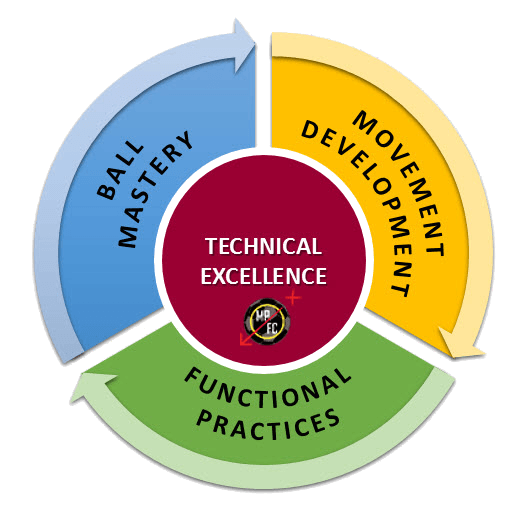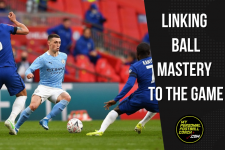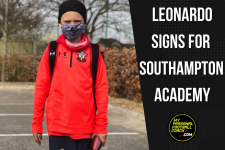Part 1: Routes to the end goal – Here I look at what we are trying to achieve and the part 1v1 soccer skills coaching can take especially in younger footballers.
Part 2: Learning Mechanisms & Education – As well teaching and coaching football, I am a keen student of the game so I highlight some of the education and sports science which contributes to my philosophy in developing footballers.
Part 3: Putting it into practice – Theory is great but does it work? In this part I show some examples of where 1v1 soccer skills coaching has been used in developing footballers whilst ensuring their creativity within the game.

My experience working with players and students.
This 3 part series is a reflection of my 14 years as football coach, 10 years as a Foundation Phase Academy Coach at Tottenham Hotspur and currently with a Premier League Club and 12 years as an individual technical coach with pdafootball.co.uk.
I will also be drawing on my 5 years’ experience of being a Primary School teacher. I mention my history because i think it is important and has led me to my coaching philosophy today which is my own and not of any organisation I am currently affiliated to.
Technical Excellence Cycle

Firstly I want to confront what I see as misconceptions being portrayed in social media and coaching forums particularly here in the UK. There is now a general myth that skills coaching curves or stunts creativity in youth footballers, by somehow taking the decision, or the discovery mechanism away from the player. This 3 part series will look to confront and dispel this misconception drawing on educational, sport science and empirical evidence.
I often think back to my time teaching in primary Schools in inner city London. The majority of the children have English as a second language. It left me wondering how challenging it must have been for them to assimilate to another country, not just learning the language but also the cultural norms and values.
I now associate this same notion to working with young, gifted and talented football players. We are trying to give them space and time to explore whilst ensuring they understand how we want the game played, i.e not smashing the ball up the pitch the whole time, not two foot tackling people. Also we want them to understand that we want them to be creative and try and open up defences, maybe dribbling with the ball, something that they may not get the opportunity to do at their grass roots clubs, maybe trying a turn or a dribbling skill in their own area rather than kicking the ball out. I see 1v1 soccer skills coaching and my philosophy as one mechanism to achieve these aspects in football without diminishing the creativity within the player and in fact enhancing it.
Now there may be many reasons to this but I think it is important to look at the cultural context. For me there is a lack of empathy with ‘skilful’ players at grass roots football because of the win at all cost, team mentality of much of youth football. There is also a general problem with people’s outlook to these sorts of players. A coach recently mentioned to me that the coaching i provide was basically a ‘how to show boat course’. This comes to the crux of the matter as where many people see effective 1v1 play as show boating or flair players, I reject this notion and see this as a key and vital ingredient to a players armoury, all players should be able to respond to a 1v1 challenge.
Now there is a school of thought that argues leaving players to develop themselves will create players like this, away from coaches who restrict their creativity. Now this is a warranted argument and players like Messi, Sanchez and Suarez support this. I argue however, the conditions in this country are different, and we have to re-create an environment where street football type activity happens. I would also go further to say, as coaches we can adjust or manipulate this environment to get more gains in the development of players able to dominate 1v1.
What is meant by the Game is the Teacher?
It’s a vague term and you will struggle to find a definitive description anywhere. This lack of clarity causes confusion which leads to many interpretations.
In its simplest form, it is to allow players to learn football by playing football with real game scenarios. This is done through small sided games at younger ages through to 11v11. Allow players to learn, explore and solve the problems they face on the pitch as this is the best teacher.
In footballing terms this would be equivalent to a footballer’s friends, teammates and teachers (coaches) along with watching the game through any medium. This observational learning is vital and I always want young players trying new 1v1 soccer skills, learning from each other, imitating what they have seen players do on TV.
Bandura’s Bobo Doll Social Experiment
This notion of supporting the player on their journey is vital, as it is important for a coach to recognise when a player needs support and when they need space to evolve by themselves. This balance will ensure the education is instilled whilst embracing the creative spark within the footballer.
Saul Isaksson-Hurst
Head Coach at MyPersonalFootballCoach.com
Part 2: Learning Mechanisms & Education
Read the full article here.





